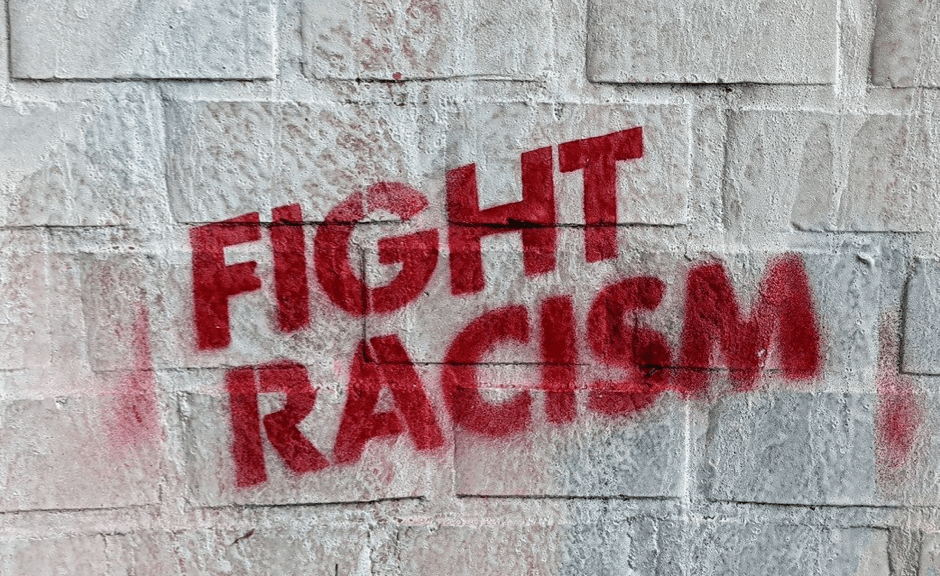
The Toxic Side of “All Lives Matter” Rhetoric
Okay, so we all KNOW a bunch of us get annoyed with the phrase “all lives matter”–for good reason– when it’s abused. A lot of us even know a lot of the reasons it bothers us. But com theory and related research can really help us see why it bothers us in a new light, and since that’s what I study and teach, I hope to explore what happens when seemingly good concepts like all lives matter “go bad,” and why that happens.
And yeah, before I start, a quick content warning: hopefully you already picked up on it in the title and intro, but I’ll be using the phrase “all lives matter” in this piece. I think as you’ll see if you hang in there with me, I’m definitely not trying to glorify the abuse of it.
In fact, I’m shooting for the opposite. Let’s hope that’s what you see too.
My Context and Standpoint, As Always
Anyway, as always, I’m approaching this as a pastor’s kid from a moderate denomination that grew up to get a PhD in Communication and study and teach about stress, trauma, and conflict communication. That’s the lens I’ll be using here.
Oh, and I’m also white. Just wanted to note that, as that’s relevant to this topic. Not only am I white, but I’m still on my own journey of understanding the privilege that I was born into with this skin color. I’m thankful for the ways my com scholar tools have helped me to understand that standpoint at least somewhat better.
And I hope this piece helps reflect what I’ve learned in a way that reduces overall harm in the world, as is the hope for everything I write here.
And I’m mostly keeping white ally audiences in mind as I write this, to be clear.
So Yeah, Back to Why the Phrase Is a Problem
I actually just touched on the question of this particular phrase in my Interpersonal COM class this week, as I do briefly every semester. I teach students raised in every political persuasion in my classrooms, so we always discuss it in as neutral a way as possible, which is very helpful for that context.
At any rate, it really hit me this week when we talked about it briefly what, through the lens of com theory, the problem with this phrase really is these days. And I wanted to reflect on it more here in the efforts of helping us look out for our neighbors and understand how language can both help and hurt those goals.
The Content Dimension/Relational Dimension Issue
Here’s what it boils down to: we who have issues with the phrase “all lives matter” don’t actually have an issue with its content dimension. Those of us who cringe at it these days have issues with the relational dimension of how it’s been abused.
This distinction pops up in the first chapter of most of the textbooks I teach from, and it’s such a helpful thing to consider carefully, especially when we find ourselves feeling unsafe around terminology that in theory we would actually agree with.
Also About Descriptive vs. Prescriptive Language Use
There’s also a distinction at play here between the descriptive (what actually is) and the prescriptive (what should be).
Unwrapping the Phrase with These Distinctions in Mind
See, on the content dimension of things and from a prescriptive perspective, most of us believe that all lives absolutely should matter for some of us.
And in fact, many of us at least aspirationally are seeking to make this statement descriptively true of the world.
Ugh, The Abuse Tho
But yeah, in reality, this phrase has been hijacked by bad actors and those they’ve persuaded to follow them. And it’s been descriptively used to bully vulnerable populations to insist that they don’t have the right to stand up and prescribe that society take action to make this statement descriptively true.
Ouch, the Genuine Trauma
And yeah, <puts on sarcasm hat>, weirdly enough, that abuse of the phrase has put us in a situation where this previously perfectly-good-in-the-right-context-and-usage phrase has caused relational damage to soooo many people. <end sarcasm>
And note that relational damage often equates to real trauma. Which means that many people who react strongly to this phrase after it’s been deeply and horribly abused by bad actors tend to have a strong physiological reaction to its use in any context.
And that in turn becomes a problem both for them and for potential allies who genuinely are trying to help, but don’t understand how trauma works and why this kind of abuse of good phrases is so insidious.
Insidiously Creating Moral Disgusts for Things that Otherwise Could Be Good
See, what this kind of abuse of a perfectly-good-in-the-right-context-and-usage phrase does is mess with the relational dimension of this phrase SO D*MNED MUCH that a whole group of people actually feels that even the appropriate usages of the phrase are tinged with moral disgust. (I’ve talked about moral disgust in a series that starts here.)
This traumatized group also comes, very naturally, to feel on a gut level, that the whole phrase is a threat overall.
And this is what makes the abuse of this phrase—and others like it—so d*mned insidious.
A Time To Mourn
See, what happens when abusers and bullies coopt this kind of phrase to literally hurt people? They manage to get well-meaning allies to pour salt into traumatized folks’ wounds every time they use the phrase in ways that would, before the abuse, have seemed entirely accurate and appropriate.
Ouch. D*mn I hate that. Let’s just sit with the grief of that for a short while, shall we?
Feeling All the Feels About This
Bad actors, by abusing good-in-the-right-context phrases, are literally stealing meaning from our lives.
As a com scholar, that gets me sooooo up in arms.
That’s not okay, friends, that bullies are able to do this.
Toward Being More Trauma-Aware in How We Use Language—and What We Don’t Say
Let’s be clear, though: no, that doesn’t mean I’m going to start throwing around all lives matter as a phrase anytime soon. The wounded populations absolutely need to heal. And that involves us collectively needing to find different words to express that sentiment for awhile.
Because that’s the trauma-aware thing to do.
Healthy Assertive Responses to the Feels
But d*mn it’s also perfectly okay and appropriate to mourn what has been lost.
It’s also highly appropriate and important to rise up in empathetic anger (I talked about this here) in response to the abuse of the phrase.
Thinking through the Loss in Context
And here’s the thing that’s so important to remember in all of this: language is big and wide and goes deep and there’s plenty of things that are just hard to express in words anyway.
And let’s be clear: descriptively, we have a long way to go, both individually and collectively, toward this statement, which was ALWAYS highly aspirational, anyway.
So we can mourn the death of the phrase, at least for now, sure.
But to be crystal clear, we don’t need it—we never needed it—to communicate through actions that we’re seeking to make it true.
Trauma-Aware Phrase Avoidance as a Good Discipline to Live It Out
And maybe not being able to say it can be a helpful discipline moving us toward showing with our actions and other words that we mean it.
Because yeah, words are meaningful. But there are lots of meaningful phrases and sentiments. And their content and relational meanings are constantly changing over time.
Losing a Battle for Meaning Doesn’t Mean We Can’t Love Our Neighbors—In Fact…
It sucks when it’s bad actors that sully things. I hate that so hard.
But losing a battle for a particular phrase like all lives matter (at least in some contexts for at least a time) most definitely does not mean we have to cede language overall.
And it most definitely does not mean we have to cede actual care for vulnerable folx.
And when in fact the fact that a phrase has been sullied means that the best way to care for vulnerable folx means we set it aside for awhile, well, that’s the best thing we can do in that given situation.
A Quick Parenthetical Note I Couldn’t Resist Adding Because COM Scholar 😉
(This might not be the appropriate response to all sullied phrases in all situations, for sure. To be clear, often some or all members of a vulnerable group choose to reclaim a sullied phrase for themselves, and that’s really cool when that happens. It gets complicated. But when it comes to the use of this particular phrase in the US lately, well…seems profoundly better not to fight too hard right now, especially when in the context of issues of race. And Just…better and more caring not to, ESPECIALLY when for those of us who were born with lighter skin and all the things that come from that standpoint in American society.)
A Final Charge
So yeah, go team #AssertiveSpirituality! Let’s have the wisdom to know when nuance is helpful and when to set it aside and just care for the wounded. Let’s be aware of the ways we can practically move beyond unwittingly amplifying the effects of bullies. And keep working against them in real ways toward a healthier world for us all. We can do this thing.

